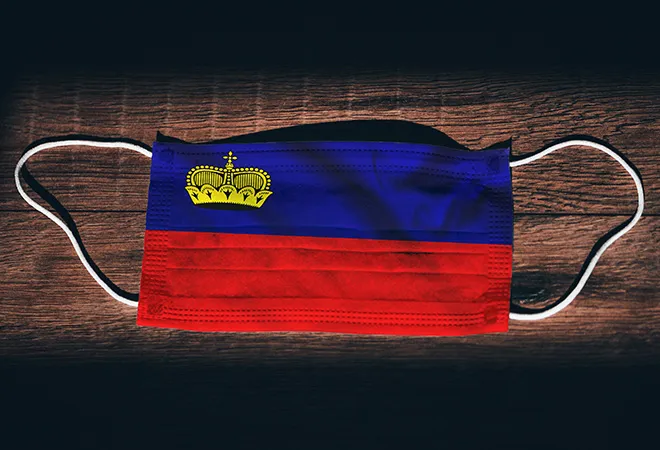
If we look at the reaction of the Principality of Liechtenstein to the COVID-19 pandemic, there are two sides: Internally, the focus was on limiting the spread of the disease while mitigating its negative impact on the economy and ensuring that the national measures are in line with international obligations. Externally, Liechtenstein has demonstrated solidarity through contributions to the UN Global Humanitarian Response plan while also advocating international cooperation by initiating – together with five other States – a COVID-19 resolution that was passed by the UN General Assembly with the active support of 188 States.
Like other countries in Europe, Liechtenstein has adopted time-bound domestic measures to respond to the COVID-19 pandemic with a view to ensure public health and safety. The Government is mindful of the severe impact of these measures on societal and economic life and is thus strongly committed to ensure and evaluate their proportionality and necessity at all times. A central element of Liechtenstein’s domestic measures is the mitigation of the grave economic impact of the COVID-19 crisis, for example by granting "short time work" to Liechtenstein companies, inter alia to prevent an increase in unemployment and resulting inequality.
All emergency measures enacted to curtail the spread of COVID-19 were adopted in the knowledge that they must be in line with international human rights law and other obligations under international law. Any derogating state response must remain subject to meaningful legislative and judicial oversight and be reviewed regularly to ensure it is necessary, proportionate and suitable to address the threat that led to its introduction at all times. Emergency legislation should be time-bound and include a specified time limitation. These criteria were satisfied in the process in Liechtenstein, which closely followed the path of neighbouring Switzerland.
It is a privilege to serve as Liechtenstein’s Minister of Foreign Affairs, Justice and Culture in today’s time of crisis. As a member of the government, I had not only the opportunity to shape the future of our own country, but to also cooperate with other countries. On 2 April 2020, the UN General Assembly adopted by consensus, and with the active support of 188 co-sponsoring Member States, the resolution “Global Solidarity to Fight COVID-19“ put forward by Liechtenstein together with Indonesia, Switzerland, Ghana, Norway, Singapore. Liechtenstein welcomes the unified message of solidarity and cooperation sent by the General Assembly in support of the crucial role of the United Nations in the global response to COVID-19. This provides a sound basis for the General Assembly to take decisions addressing the operational needs of the UN.
Liechtenstein furthermore contributes a substantive amount to the Secretary General’s Global Humanitarian Response Plan to COVID-19. The contributions are directed to the efforts of the World Health Organisation, the office of the UN High Commissioner for Refugees, and the World Food Programme.
Liechtenstein is committed to solidarity, and will provide further assistance, both through bilateral and multilateral channels, in these times of unprecedented crisis. The international response to the COVID-19 pandemic must be guided by solidarity, cooperation and the rule of law. The protection of fundamental rights and freedoms must be the basis for all measures to respond to the COVID-19 crisis. Measures should be holistic and aimed not only at ensuring public health and safety but also at guaranteeing social peace and protecting the most vulnerable groups without discrimination. Strong democratic and accountable institutions are essential for an effective response to the COVID-19 pandemic, which cannot serve as a pretext to undermine the international and national rule of law or human rights standards.
Liechtenstein supports and commends the work of the United Nations, the Council of Europe and the Organisation for Security and Cooperation in Europe (OSCE) aimed at upholding human rights, democracy and the rule of law, and for their strong response to the COVID-19 crisis. Liechtenstein is committed to fully cooperate with them in preventing and addressing negative developments in this respect.
To give an example, freedom of expression and freedom of the media are essential for an efficient response to the COVID-19 pandemic. It is of utmost importance that journalists and human rights defenders can exercise their profession without undue interference and that states provide full access to unbiased information on the public health situation and the measures undertaken to combat COVID-19. Free and independent media as well as a strong civil society remain fundamental building blocks of a vibrant, well-functioning democracy. The timely dissemination of accurate, clear and evidence-based information is essential for an effective response to the COVID-19 pandemic and helps address and prevent discrimination and xenophobia, which feed on misinformation and fear. Additional efforts are needed to monitor incidents of discrimination and xenophobia, and responses to any incidents should be swift and well-publicised.
Furthermore, Liechtenstein fully supports the call by the United Nations Secretary-General António Guterres for an immediate global ceasefire in all corners of the world. Access to populations that are most vulnerable to the spread of COVID-19 – particularly in regions already ravaged by armed conflict – is of critical importance. As further highlighted by United Nations Secretary-General, the COVID-19 pandemic is likely to increase inequality within and among countries, unemployment, stigmatization, and exclusion.
While all States need to respond to COVID-19, those with pre-existing humanitarian or economic crises are most vulnerable. Inequality and extreme poverty are likely to be exacerbated by the health crisis. This can have a detrimental secondary effect on the protection of human rights. We must also bear in mind that there is an increased risk for vulnerable people becoming victims of modern slavery and human trafficking. The Liechtenstein Initiative on Finance Against Slavery and Trafficking (FAST) equips financial actors to better respond to and prevent modern slavery and human trafficking, issues that have further gained in relevance in times of the COVID-19 pandemic.
The views expressed above belong to the author(s). ORF research and analyses now available on Telegram! Click here to access our curated content — blogs, longforms and interviews.




 PREV
PREV


